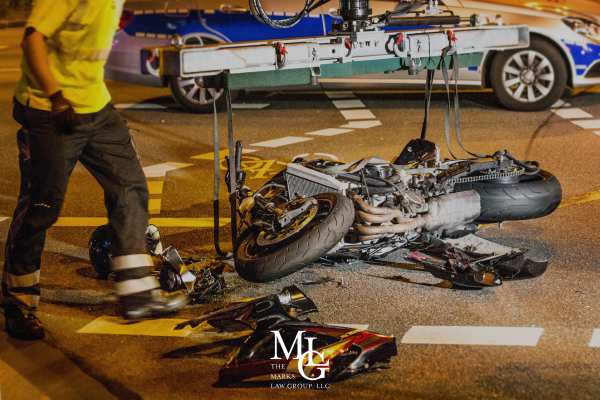Lane splitting, the practice of riding a motorcycle between lanes of traffic, is a common but controversial maneuver in many parts of the country. In Georgia, however, lane splitting is illegal, and motorcycle riders who engage in this practice could face legal challenges if involved in an accident. Understanding the potential liabilities associated with lane splitting is crucial for riders in Georgia to avoid accidents and navigate any legal consequences effectively.
If you’ve been involved in a motorcycle accident while lane splitting in Georgia, it's essential to understand your legal rights and responsibilities. An experienced Decatur motorcycle accident attorney can help assess the details of your case and provide the guidance needed to protect your interests. Call Marks Law Group at (678) 251-9309 today to discuss your situation and ensure you’re fully informed about the potential liability in a lane splitting accident.
Is Lane Splitting Legal in Georgia?
Lane splitting is not legal in Georgia. Lane splitting refers to the practice where a motorcyclist rides between two lanes of traffic, typically in slow-moving or stopped traffic. In Georgia, this maneuver is prohibited under state law, and motorcyclists must remain in their designated lane.

Motorcyclists in Georgia are expected to follow the same traffic laws as other vehicles, including staying within the lane and not passing between vehicles unless there is a designated lane for such purposes (e.g., bike lanes or other specific roadway designs). Violating lane splitting laws could result in fines or other penalties.
If you are a motorcyclist, it’s important to understand and follow the traffic laws in Georgia to avoid accidents or legal issues.
How Lane Splitting Impacts Accident Liability in Georgia
In Georgia, lane splitting is illegal, and if a motorcyclist is involved in an accident while lane splitting, it can significantly impact accident liability. Here’s how:
Contributory Negligence
If a motorcyclist is lane splitting and gets into an accident, they may be considered partially or fully responsible for the accident under Georgia’s contributory negligence laws. If the motorcyclist is found to have contributed to the accident by lane splitting, their ability to recover damages could be reduced or even denied. The courts will look at whether the motorcyclist was following the law and if their actions led to the crash.
Insurance Company Evaluations
In the case of an accident, insurance companies may use lane splitting as a factor in determining fault. Since lane splitting is illegal in Georgia, insurers may argue that the motorcyclist was engaged in reckless or unsafe behavior, which could reduce or void their claim. If the other driver was at fault, however, the motorcyclist's lane splitting could still be factored into the insurance company's decision on liability.
Increased Liability for the Motorcyclist
If the motorcyclist is found to be lane splitting at the time of the accident, they could face an increased liability for the crash. This is especially true if the lane splitting directly contributed to the collision, such as causing another driver to swerve or stop suddenly.
How Comparative Fault Affects a Claim
In the event of a court case, a judge may determine that lane splitting contributed to the accident, making the motorcyclist partially at fault. In Georgia, the state follows a comparative fault rule, which means that if both parties are found to share fault, the damages awarded to the motorcyclist may be reduced in proportion to their degree of fault. If the motorcyclist was found to be primarily responsible for the accident due to lane splitting, they might not be awarded any compensation.
Impact on Claims for Personal Injury
Motorcyclists who were lane splitting at the time of an accident could face challenges in pursuing personal injury claims. The illegal nature of lane splitting could be used as a defense against a motorcycle accident claim, and they might have difficulty proving that the other party was entirely or even partially responsible for the incident.
Overall, lane splitting in Georgia can complicate an accident case, affecting both liability and the ability to recover damages. Motorcyclists should avoid lane splitting to reduce the risk of legal complications and ensure they are not held liable for accidents caused by their own illegal actions.
Challenges in Proving Liability for Lane Splitting Accidents
Insurance companies may try to argue that lane splitting automatically places full liability on the motorcyclist, given that lane splitting is illegal in Georgia. They may claim that the motorcyclist's actions were reckless or negligent and that their illegal maneuver caused or contributed to the accident. However, an experienced auto accident lawyer can challenge these arguments by demonstrating that the motorcyclist was not solely at fault or that other factors, such as driver negligence or road conditions, played a role in the accident.
Georgia follows a comparative negligence rule, meaning that if multiple parties are at fault, the damages awarded will be reduced in proportion to each party’s degree of fault. This can be a challenge in lane splitting cases, as the motorcyclist may be assigned partial fault for engaging in an illegal maneuver. However, comparative fault doesn’t automatically bar the motorcyclist from recovery.

For example, if the other driver also played a role in causing the accident, such as by failing to yield or driving distracted, the motorcyclist may still be entitled to some compensation. An attorney can argue that the motorcyclist’s degree of fault is less than the other party's, thus minimizing the impact on the compensation awarded.
Having legal representation is crucial in these cases. An attorney can gather evidence, such as witness testimony, accident reports, and video footage, to show that lane splitting was not the primary cause of the accident. They can also argue that the motorcyclist’s actions were not reckless and that the other driver’s negligence or other factors contributed significantly to the crash. With the right legal defense, an attorney can work to reduce the motorcyclist's percentage of fault and increase the likelihood of recovering compensation for injuries and damages.
Can a Motorcyclist Get Damages After an Accident Even If They Were Lane Splitting?
Yes, a motorcyclist can still recover damages even if they were lane splitting, but the process may be more complicated. In Georgia, where lane splitting is illegal, the motorcyclist may be considered partially or fully at fault for the accident. However, recovery is still possible under certain conditions, depending on the circumstances of the crash and the degree of fault assigned to each party.
Here’s how it works:
- Comparative Fault and Recovery: Georgia follows a comparative fault rule, meaning that a motorcyclist can recover damages even if they were partially at fault for the accident, as long as their degree of fault does not exceed 50%. If the motorcyclist is found to be 20% at fault for lane splitting, they can still recover 80% of the damages.
- Other Contributing Factors: If the other driver’s actions contributed significantly to the accident, such as by failing to yield, speeding, or driving recklessly, the motorcyclist may still be able to recover damages. An attorney can investigate the accident to determine if the other driver was also at fault and argue that their negligence played a larger role in the crash.
- Proving Minimal Fault: An experienced attorney can help minimize the motorcyclist's fault by presenting evidence that lane splitting was not the primary cause of the accident. For example, they may argue that the other driver’s failure to pay attention or other road conditions were more to blame.
- Insurance Company Defense: Insurance companies may attempt to argue that the motorcyclist's lane splitting automatically makes them fully responsible for the crash. However, an attorney can challenge this defense by highlighting factors such as the behavior of the other driver, road conditions, or evidence that the motorcyclist’s lane splitting did not directly cause the accident.
In summary, while lane splitting in Georgia may complicate the recovery of damages, a motorcyclist can still pursue compensation, especially if they were not primarily at fault. Meeting with an injury attorney can help build a case to reduce the motorcyclist’s liability and ensure a fair chance of recovering damages for injuries and other losses.
Get Legal Advice if You’ve Been Involved in a Lane Splitting Accident
Lane splitting can lead to significant liability issues for motorcycle riders in Georgia, particularly if an accident occurs. If you’ve been involved in an accident while lane splitting our injury law firm is here to protect your rights and navigate any potential legal challenges. Reach out to us today to discuss your case and explore the options available to you. Let us help you move forward with confidence.
